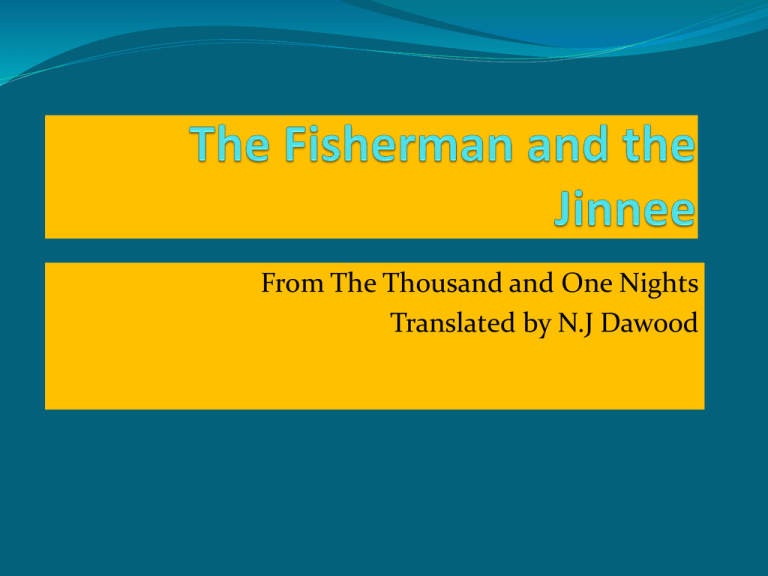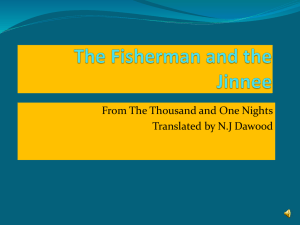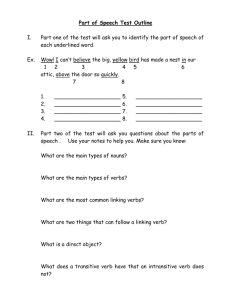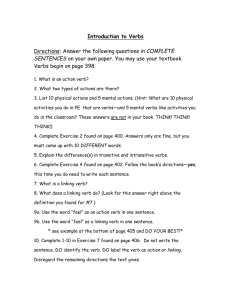The Fisherman and the Jinnee
advertisement

From The Thousand and One Nights Translated by N.J Dawood The Fisherman and the Jinnee Ancient Persian and Muslim Folklore Has story-within-a-story structure Folktales – part of the oral tradition passed down by word of mouth for centuries before being written down. Usually contain magical details Usually contain a lesson about life Usually contain characters who possess on or two main traits Usually contain a clear separation between good and evil. Reading Strategy: Summarizing A Summary is a brief statement expressing the key details of a literary work. To summarize: Identify the details that are essential to your understanding of the story Next, organize those details into a concise statement Summarize to aid your understanding of literature. Vocabulary Builder Inverted Blasphemous Adjured indignantly Resolutely Adj. upside down Adj, showing disrespect toward God or religious teachings Ordered solemnly Adv. In a way showing righteous anger or scorn Adv. In a determined way Vocabulary Continued Enraptured Adj. Completely Munificence delighted; spellbound N. Great generosity ominous Adj. Hinting at bad things to come Word Analysis: Latin Root - vert The Latin root –vert- means “turn.” Inverted – means “turned upside down.” Using your understanding of the root word –vert-, write a brief definition of the italicized word in each of the following sentences: We can convert this old theater into a store. If the new system does not work, we will revert to the old one. The plane was diverted to another airport. Spelling Strategy – “f” Spelled as “ph” The f sound is sometimes spelled ph, as in blasphemous. More often, it is spelled f or ff: fish, staff. Rewrite the following sentence, correcting the misspelled words in italics. The fysician was bafled by the ffisherman’s afliction. Vocabulary Builder: Synonyms Select the word that is closest in meaning to the first word: Inverted: a) reversed b) wicked c) shy Blasphemous: a) loud b) unwise c) sinful Adjured: a) disliked b) commanded c) healed Indignantly: a) angrily b) noisily c) slyly Resolutely: a) weakly b) helpfully c) stubbornly Enraptured: a) puzzled b) repressed c) charmed Munificence: a) poverty b) violence c) violence Ominous: a) shining b) threatening c) open Grammar and Style Lesson Action Verbs such as saw, thought , and went, express physical or mental action. Linking verbs, such as was, felt, and became, express a state of being. Linking verbs are followed by a noun or pronoun that renames the subject or by an adjective that describes it. Some linking verbs can also function as action verbs. If you can replace the verb with a form of be – such as am, is, are, was, were - and still express a similar meaning, the verb is a linking verb. Action and Linking Verbs Action Verb Linking Verb The Fisherman looked in the The jinnee looked monstrous bottle We tasted the food. (was) The food tasted good. (was) Notice how the subject takes action to perform the verb. Notice how the subjects are in a state of being; they cannot perform an action. Notice how both highlighted verbs can be replaced with the being verb “was.” Action and Linking Verbs Identify the verb in each sentence below as an action verb or a linking verb. The bottle appeared heavy. The fisherman broke the seal. Once outside, the jinnee seemed like a powerful giant. The fisherman felt enormous fear. The fisherman tricked the jinnee in the end.







